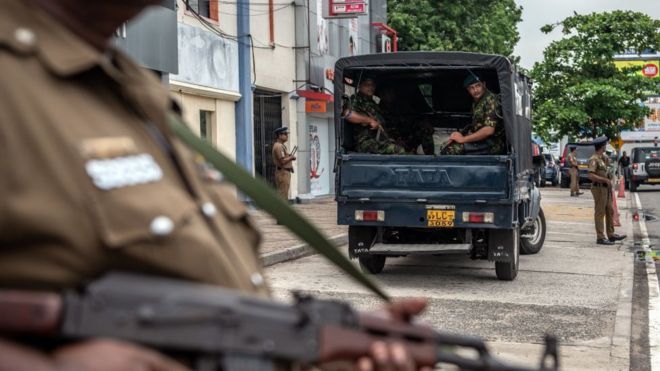 GETTY IMAGES
GETTY IMAGESSri Lanka bombings: Bodies found after gun battle in Sainthamaruthu
The bodies of 15 people have been found after a fierce gun battle between Sri Lankan police and suspected Islamist militants in the east of the country.
The clashes took place in Sainthamaruthu, not far from the home town of the suspected ringleader of the Easter Sunday suicide attacks.
Residents told the BBC they heard gunshots and explosions over two hours.
Security forces have carried out raids across the country since the bombings last Sunday, which killed at least 250.
In another development, the Catholic Church in Sri Lanka cancelled all Sunday Masses until further notice, citing a risk of further attacks.
Archbishop of Colombo Malcolm Ranjith said he had seen a leaked security document warning of further attacks.
He also said he had felt "betrayed" after it emerged that the government had failed to act on warnings of the bombings.
- What led to Sri Lanka's Easter carnage?
- The victims of the Easter Sunday bombings
- US woman wrongly identified as suspect
The subsequent co-ordinated suicide bombings on three luxury hotels and three churches last Sunday claimed at least 250 lives.
Authorities have blamed a local Islamist extremist group, National Tawheed Jamath, for the attacks, although the Islamic State group (IS) has also said it was behind them.
Security was stepped up around mosques for Friday prayers as some Muslims stayed away, fearing revenge attacks.
What's the latest?
Sri Lankan police said they had exchanged fire with an armed group in the east of the country on Friday as they searched for those linked to the bombings.
Police said officers acting on a tip-off had launched a raid in Ampara Sainthamaruthu, near Batticaloa, and an armed group set off an explosion. A gun battle then ensued.
When troops moved in after dawn on Saturday they found 15 bodies believed to be those of the suspected gunmen but also some civilians caught in the crossfire.
The area is not far from the home town of radical preacher Zahran Hashim - the suspected ringleader of the attacks.
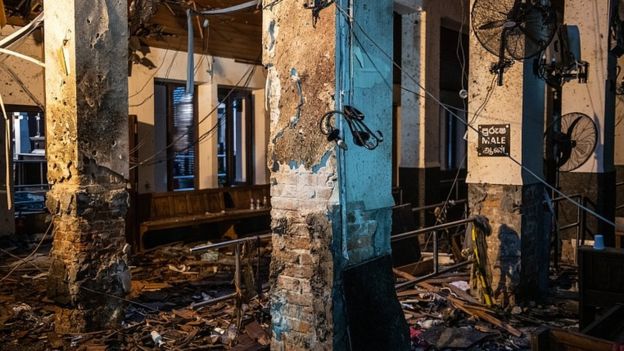 GETTY IMAGES
GETTY IMAGESIn another raid in the same town police found IS flags, 150 sticks of gelignite, thousands of steel pellets and a drone camera, a military spokesman said.
Police quoted by local media said 10 arrests were made across the country on Friday bringing the number detained since last Sunday to 80.
President Maithripala Sirisena has told reporters that intelligence services believed about 130 suspects linked to IS were in the country and that police were hunting 70 who were still at large.
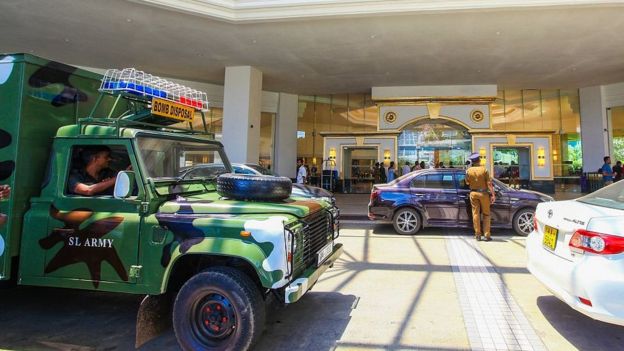 GETTY IMAGES
GETTY IMAGESMeanwhile, the manager of one of the Colombo hotels targeted by a suicide bomber has told the BBC of the moments leading up to the deadly attack.
Rohan Karr said the man had checked into the Cinnamon Grand hotel the evening before, was served a welcome drink and then went up to his room.
"He came down in the morning with the rucksack on his back and he went into the restaurant. He made sure he got a table right in the middle of the restaurant and he was walking around with the rucksack on his back but we never thought 'this was the man who going to kill us'.
"He sat, he ate, he waited for people to gather towards the buffet. When he saw a bigger crowd that was the time he decided, this is the time for me to create maximum damage."
What did the archbishop say?
Cardinal Ranjith said that the Church had not been told about intelligence warnings of possible attacks.
"We didn't know anything. It came as a thunderbolt for us," he told reporters.
Asked about the warnings he said: "I felt betrayed a little bit. I felt sad. It's a very serious lapse on the part of the security agencies that they didn't tell us about it."
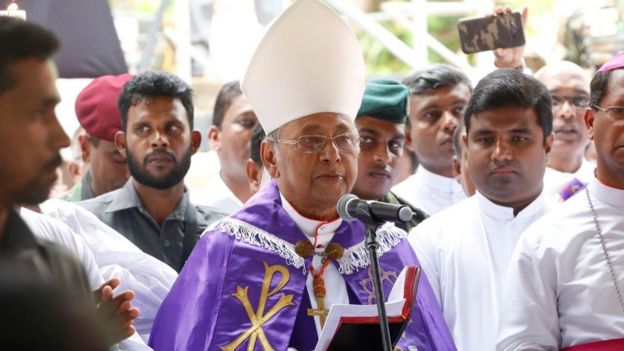 GETTY IMAGES
GETTY IMAGESCardinal Ranjith added: "Due to the ongoing security situation and continuing threats... we have stopped all Sunday Masses until further notice."
He said parishioners should instead "stay indoors and do their prayers" and that only when the security situation had improved would small services resume.
What is the political fallout?
Sri Lanka's police chief and top defence ministry official have both resigned over the bombings.
But Sri Lanka's Prime Minister Ranil Wickremesinghe has said that crucial intelligence warnings had not been passed on to him. He argued that as he had not been aware of the warnings, he did not need to step down from his position.
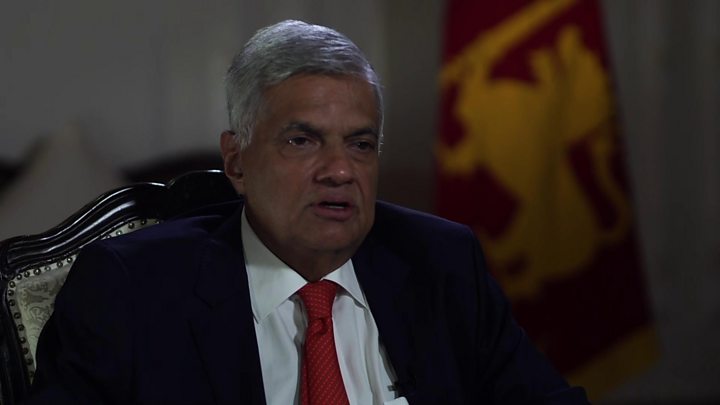
"If we had any inkling, and we had not taken action, I would have handed in my resignation immediately," he said, adding: "But what do you do when you are out of the loop?"
The breakdown in communication has refocused attention on the infighting between the country's two most powerful men - Mr Wickremesinghe and President Maithripala Sirisena.
Relations between the two deteriorated to such an extent that last October, Mr Sirisena sacked Mr Wickremesinghe. He was reinstated in December following rulings by Sri Lanka's highest courts.
Who were the attackers?
Nine people are suspected of carrying out the attacks. President Sirisena confirmed that the alleged ringleader, Zahran Hashim, died in the attack at the Shangri-La hotel in the capital, Colombo.
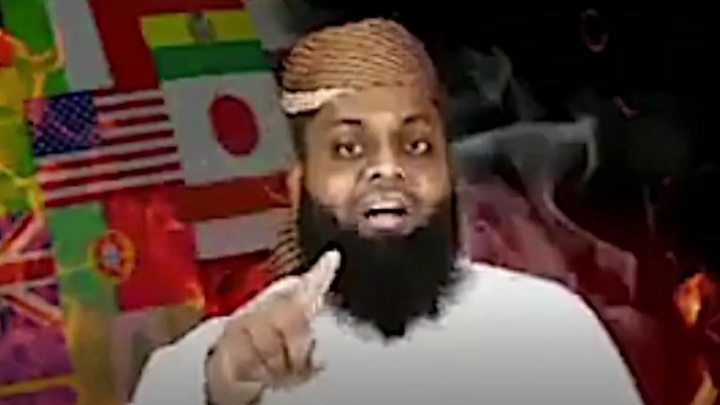
Two of the bombers are said to have been the sons of spice trader Mohammad Yusuf Ibrahim, one of Sri Lanka's richest men. Mr Ibrahim was detained and questioned after the attacks.
- Sister of 'ringleader' deplores attack
One of his sons was reportedly the second bomber at the Shangri-La hotel alongside Zahran Hashim. The other son reportedly targeted the restaurant at the high-end Cinnamon Grand hotel, a short distance away.
A woman said to be a wife of one of Mr Ibrahim's sons detonated explosives during a police raid at the family's villa on Sunday. Several people, including children and three police officers, were reportedly killed in that blast.
According to the Sri Lankan government, most of the attackers were "well educated" and had come from "middle- or upper middle-class" families.
- Sri Lanka attacks: Who were the bombers?
Another of the alleged bombers studied in the UK, a senior Whitehall official told the BBC. Abdul Latif Jamil Mohammed studied aerospace engineering at Kingston University in 2006-7 but did not complete a full degree.
Source : BBC News

No comments:
Post a Comment